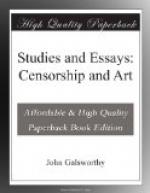Further, if there were but a Censorship of Literature, no matter how dubious the books that were allowed to pass, the conscience of no reader need ever be troubled. For, that the perfect rest of the public conscience is the first result of Censorship, is proved to certainty by the protected Drama, since many dubious plays are yearly put before the play-going Public without tending in any way to disturb a complacency engendered by the security from harm guaranteed by this beneficent, if despotic, Institution. Pundits who, to the discomfort of the populace, foster this exemption of Literature from discipline, cling to the old-fashioned notion that ulcers should be encouraged to discharge themselves upon the surface, instead of being quietly and decently driven into the system and allowed to fester there.
The remaining plea for exempting Literature from Censorship, put forward by unreflecting persons: That it would require too many Censors—besides being unworthy, is, on the face of it, erroneous. Special tests have never been thought necessary in appointing Examiners of Plays. They would, indeed, not only be unnecessary, but positively dangerous, seeing that the essential function of Censorship is protection of the ordinary prejudices and forms of thought. There would, then, be no difficulty in securing tomorrow as many Censors of Literature as might be necessary (say twenty or thirty); since all that would be required of each one of them would be that he should secretly exercise, in his uncontrolled discretion, his individual taste. In a word, this Free Literature of ours protects advancing thought and speculation; and those who believe in civic freedom subject only to Common Law, and espouse the cause of free literature, are championing a system which is essentially undemocratic, essentially inimical to the will of the majority, who have certainly no desire for any such things as advancing thought and speculation. Such persons, indeed, merely hold the faith that the People, as a whole, unprotected by the despotic judgments of single persons, have enough strength and wisdom to know what is and what is not harmful to themselves. They put their trust in a Public Press and a Common Law, which deriving from the Conscience of the Country, is openly administered and within the reach of all. How absurd, how inadequate this all is we see from the existence of the Censorship on Drama.




